Searching for summer on the Sunshine Coast
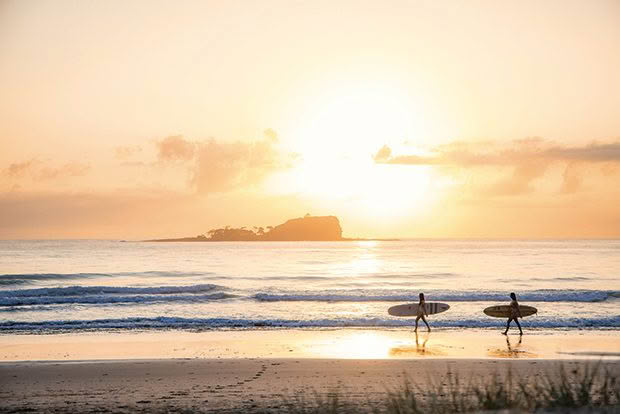
After a summer without sun, a journey to Australia’s Sunshine Coast supplies a dose of the good stuff.
Words: Sarah Templeton
“There – two, at least!” The jubilant (and relieved) cry comes from a dad of two, who has been combing the water with his eyes for the past hour. He’s been worrying the promised exciting “activity day” of the family holiday will be a ghastly failure if a glistening grey hide goes unspotted. His hasty calculation of “10 o’clock!” sparks a chaotic, stumbling rush to the front edge of our double-decker boat, Sunreef One, rocking under the pressure of the strong waves off the Sunshine Coast. A woman with a giant Nikon camera pushes a child out of the way in her haste to capture the fast-disappearing line of a humpback, unfazed by the fuss, descending underwater.
The whales, a pod of three, care little about the group’s desperation to glimpse the pointed form of a tail — or even better — the majestic rise of a head. It’s migration season, and they only care about journeying into warmer waters to give birth to their babies, accompanied by their humpback guides. If the young humpbacks do their jobs well enough, the females may choose to mate with them next year. It’s considered the long game of courtship.
All the activity is conveyed by Sunreef One’s mic-wielding Ricky, who valiantly keeps spirits high with whale facts even as the creatures submerge again and stubbornly refuse to disclose their next location with a gust of spray.
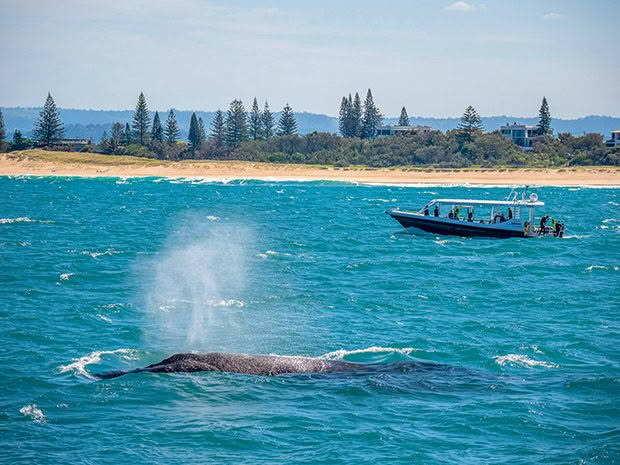
Humpback whales show off for fans during a whale-watching tour aboard the Sunreef.
Like the family of whales, I’ve migrated in search of warmer climes. Mid-winter brings mild temperatures and clear skies on the appropriately named Sunshine Coast, where I’m spending a few days escaping Auckland’s relentless thunderstorms. Being out on the water is a pleasure that soothes the sting of a less-than-stellar summer. Vitamin D supplements can remain in the medicine cabinet for another month.
I have only four days to scratch the surface of a small portion of the coastline, journeying up the Sunshine Highway from Mooloolaba to Noosa.
Along with the sun, arguably the most defining aspect of this 60-kilometre stretch of Queensland coast is its wildlife: predominantly ocean-dwelling and often deliciously edible. Sunreef One’s Ricky explains that while whales mainly fast during migration, they are “opportunistic eaters”. “They’ll eat whatever comes in front of them,” he explains.
I very much relate. There is a special kinship — one known well in Aotearoa — for being around the water and eating its delicious treasures. Salty fragrant air and sunburnt skin call for the freshness of seafood.
Barely an hour off the plane, I’m holding a glass of bubbles, cruising Mooloolaba’s manufactured and mansion-lined canals aboard The Duffy, an electric vessel.
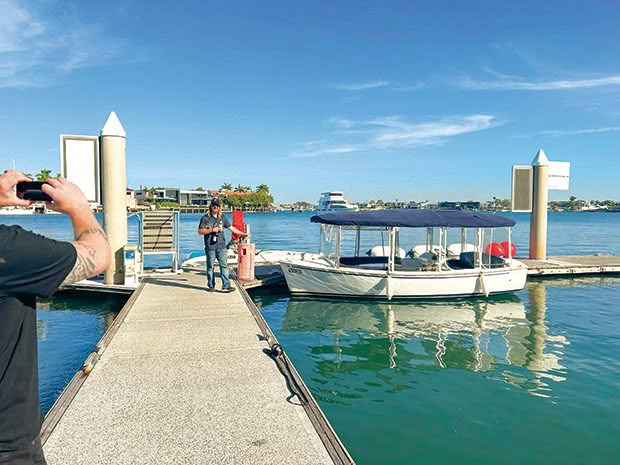
Captain Jared with the fully electric Duffy canal cruiser.
We’re en route to the Mooloolaba Fish Market under the guidance of Josh Donohoe, owner of Creative Tours. Josh brings together local operators to create bespoke experiences for private groups. Today’s Trawler to Table experience, designed for seafood fanatics, employs the services of Coastal Cruises Mooloolaba. The Duffy was an addition to the Coastal Cruises fleet bought at the request of Captain Jared’s mother so she could “take the girls out for a few hours down to the fish market”.
Before docking, we pass some mammoth sea trawlers. The occupants of these vessels spend weeks on the open ocean, selling their catches to local restaurants and the famous fish market. Two weeks on the water will bring in anywhere between 1000 and 5000 cartons of prawns, each weighing about five kilogrammes.
It feels like most of that haul is on display on this sunny Sunday afternoon. Orange shells and beady black eyes are everywhere in the fish market. Jandal- and swimsuit-wearing customers flood the fish-and-chip shop on the ground level, swinging their prawn-by-the-kilo bags. Like champagne and bluff oysters, mooloolaba prawns are blessed with the excellent PR of being a beloved food synonymous with a place.
Josh and Jared teach us how to deconstruct a prawn. A head twist, two fingers hooked under the belly shell, give the tail a squeeze and wiggle. Pop! Off comes the shell, leaving succulent white flesh. On a giant dish, I gorge like Neptune and Salacia until my fingers are stained orange and my zinc levels are restored.
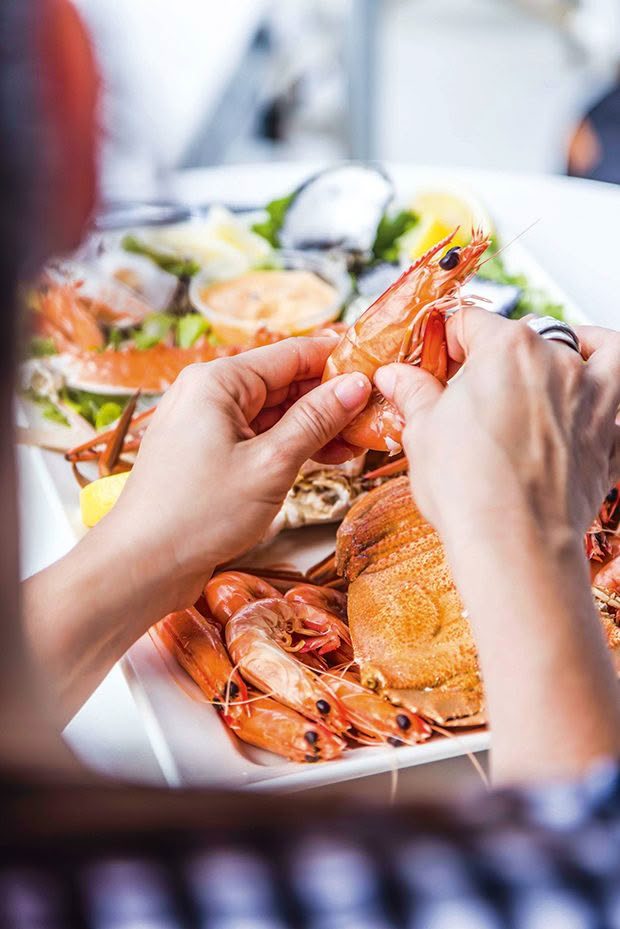
Mastering prawn deconstruction.
After ocean vessels and canal cruising, day three sees me 40 minutes up the coast on a very different ship. The Noosa North Shore car ferry carries passengers from Noosa’s main beat to the dense everglades of its north shore. It’s a journey that takes about 90 seconds. Waiting to board, I wonder why they don’t build a bridge across the extremely short passage of water. But as we drive on in tandem and fork out $10 notes per car for the one-way trip — and spy a line of cars waiting to do the same on the other side — the ferry’s financial value is apparent.
My expensive but necessary craft is taking me to meet creatures of a different kind: the four-legged, predominantly land-dwelling variety. A 15-minute drive inland through white-trunked trees reveals the blue fencepost marking the driveway for Equathon Horse Riding, which has become popular for its scenic beach rides.
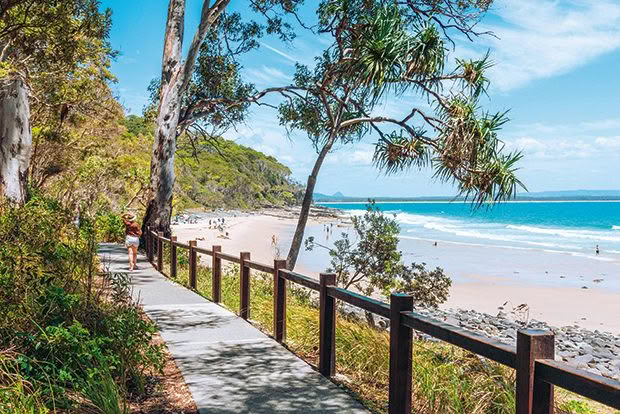
Walks through the Noosa National Park offer spectacular coastal scenery and dense forest.
For a newbie like me, mounting the gentle giant clydesdale cross, Toby, is a little nerve-wracking. I am suddenly extremely high, leaving sea level far below me. Under the patient tutelage of my instructor Mia, I’m taught basic commands, including how to give Toby a firm nudge with my foot to get him moving.
I give a fearful, gentle little toe tap. Nothing happens. “You can go a little harder than that,” Mia assures me. It turns out the 16-hand, 600-kilogramme horse can take my nervous nudging. A slightly firmer prod, and we lurch across the sand.
I’m joined by a new friend Rhi, a slightly more experienced rider, on the Sunshine Coast for a family holiday. Usually, the two-person rides are more romantic in nature, but on ours, a new fast friendship is born.
She and Mia are very encouraging as we trot — okay, fine, walk — along the smooth white stretch of sand. It feels like we’re on the edge of the world. Apart from our chattering, the only sounds are the soothing swell of waves and the grumph of the horses snorting sand from their noses.
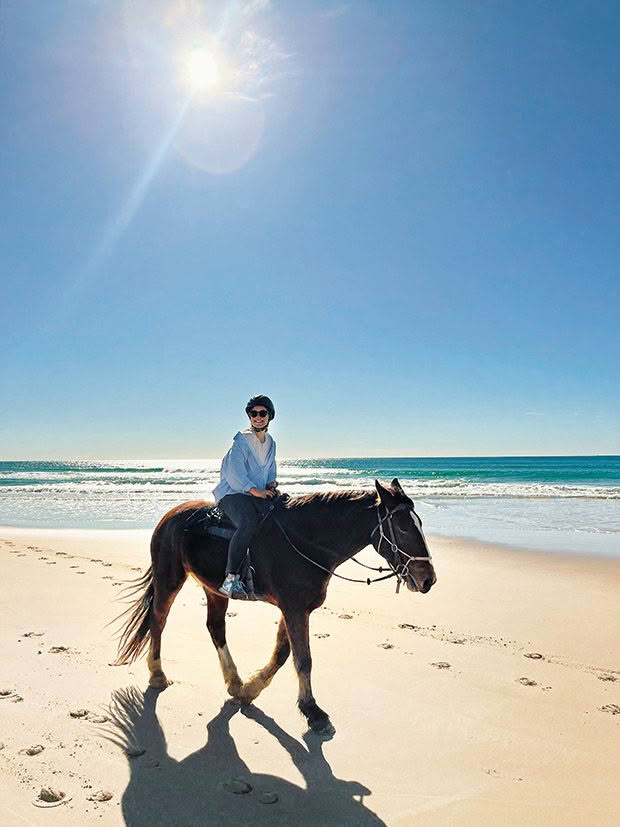
The writer and her new mate Toby hit their stride along a deserted stretch of Noosa shoreline.
Toby and I are soon firm friends, although he’s hesitant to paddle into the water for a photo op. It takes some coaxing to get his hooves in, even though Mia assures me that he loves a swim come the searing heat of summer. Perhaps he’s heard I’ve been gorging on seafood and is worried he might make it to the menu?
As we return to the cars, sun-kissed, salt-sprayed and feeling all too comfortable with basic riding, I’m humbled by my former friend. Toby’s spotted some delicious-looking bush scrub to our left, and knowing he has a beginner on his back and the watchful eyes of his adoring handlers are momentarily distracted, he makes a beeline. I suddenly find myself looking down at the bush bordering the car park.
“Toby!” Mia chastises him and leads him back, still munching, so I can dismount. “Your eyes are bigger than your stomach!”
Toby gives me a dutifully apologetic whoosh of air in my hair, and all is forgiven. On the Sunny Coast, the horses, like the whales — and me — are opportunistic eaters. Who could blame them? They’re in the right place.
NOTEBOOK
Getting there: Air New Zealand relaunched direct flights from Auckland to the Sunshine Coast in June, running a service three times a week until 15 October 2023. If you’re travelling outside of June to October, Air NZ and Qantas fly direct to Brisbane daily. From there, it’s a 90-minute drive north to Mooloolaba up the Sunshine Coast Highway. The average Auckland to Sunshine Coast flight time is just under four hours, while the Auckland to Brisbane flight time is about three hours and 45 minutes.
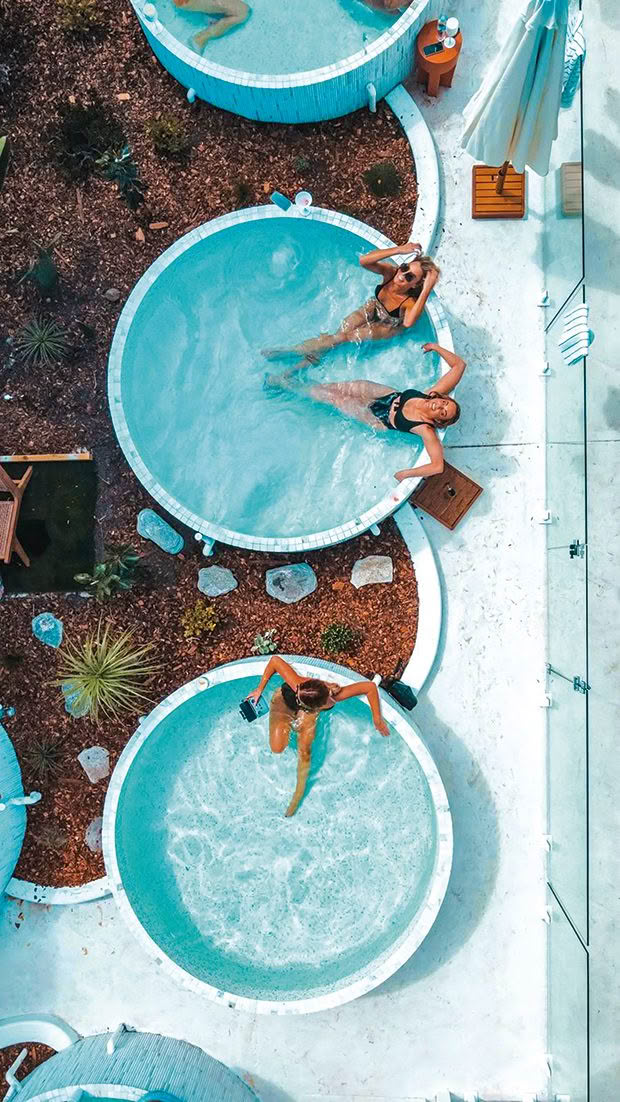
Move between the pools at Tank Bathhouse Day Spa to take advantage of the therapeutic benefits of hot and cold temperature changes.
MOOLOOLABA
Where to stay: There are plenty of high-rise, self-contained apartment buildings along the Mooloolaba shoreline. Opt for an ocean-view room at the Newport Apartments, and you’ll have everything you need for a family stay — including a fully equipped kitchen and ensuite bathroom. There’s also a temperate pool and private car parks. Best of all, it’s a short stroll to the beach and the popular Mooloolaba Surf Club.
Where to eat: Head to The Wharf precinct for multiple options. See Restaurant is the only eatery in Mooloolaba that offers over-water dining, and you can fully immerse yourself in a seafood-centric menu. Owners, husband-and-wife duo Antonio and Wendy, offer efficient, friendly service making you feel like you’ve popped into their house for lunch. Don’t miss the oysters, which have been harvested and shucked 100 metres down the wharf. For a quick and trendy option, queue for the neon-lit Rice Boy. Or, for a special occasion, opt for its glamorous dark-panelled older sibling, RB Dining. The lobster bao is a standout.
What to do: The natural magnesium pools of various temperatures at Tank Bathhouse Day Spa allow sore muscles to relax and unwind. Book a treatment (Jasmine, the masseuse, is a genius) for extra pampering. Bonus: cocktail consumption is allowed in the pools — encouraged, even.
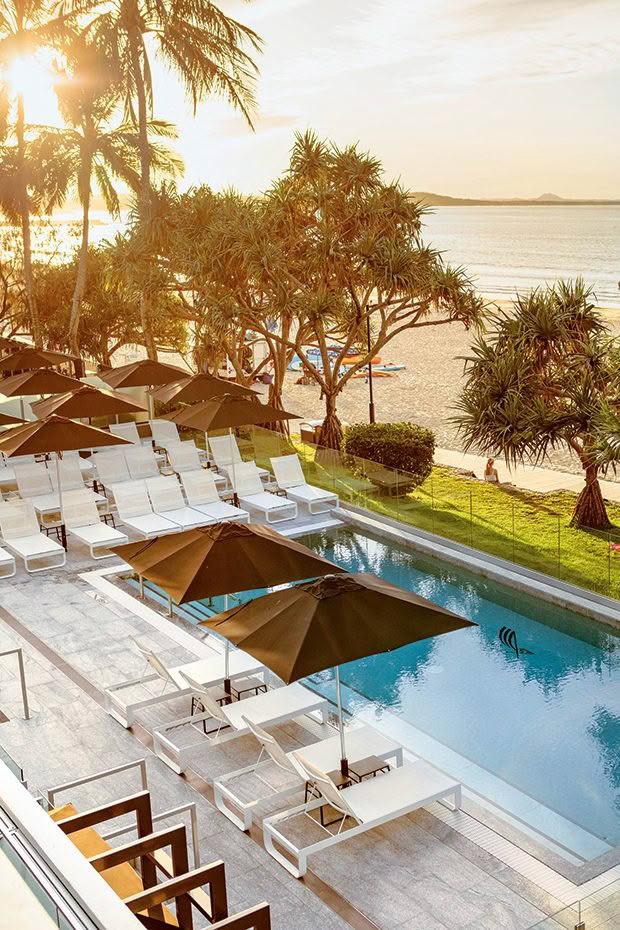
Swim with sunset views at the Netanya Noosa Beachfront Resort.
NOOSA
Where to stay: Boutique hotels line the beach in Noosa so early risers can wake to unreal sunrise views. The Netanya is equidistant to the beach and Hastings Street shops and has the fantastic café, Providore, on its ground floor. Pop down to grab a coffee and croissant and enjoy both on your deck after a morning swim.
Where to eat: Noosa is known for its ocean-view restaurants. Sails and Season have excellent wine lists and serve food metres from the white sand. Overindulgence in seafood and cocktails can be countered by walking down Hastings Street to Oakberry for a fresh and nutritious açaí bowl with fruit, granola and all the trimmings.
What to do: Stretch the legs on the 10.8-kilometre Noosa Coastal Walk, between the Noosa Headlands and Sunshine Beach. Small bays and spectacular lookouts like Boiling Pot (named for its view of water lashing against rugged rocks) allow sightings of dolphins or whales in the water and koalas snoozing in the trees. But be wary of giant board-wielding surfers returning to the car park.
Love this story? Subscribe now!
 This article first appeared in NZ Life & Leisure Magazine.
This article first appeared in NZ Life & Leisure Magazine.
